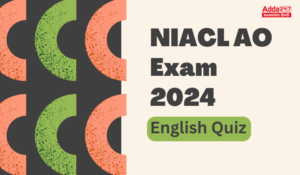
TOPIC: Cloze Test
Direction (1-7): In the following passage, some blanks are
given and against each blank five alternative words are suggested. Choose the
correct alternative to complete the passage in a meaningful way.
We know that ________________ (1) untreated industrial
produce or sewage into rivers will pollute them. But industries and local
bodies do it anyway. We know our unsustainable thirst for coal or minerals like
gold is ________________ (2) entire hills, accelerating biodiversity
loss and affecting the people living near these areas as well as working there.
Governments and corporations mine them anyway. There’s a word for such
sustained, ________________ (3) actions that we commit despite knowing
fully well their monumental and widespread ecological and environmental
fallouts: ecocide. It is, literally, ‘the ________________ (4) of the
environment’.
Ecocide refers to actions that result in the willful,
conscious destruction of the natural environment with consequences for human,
animal and plant life. That’s the ________________ (5) in which
biologist Arthur Galston used the term for the first time in 1970, at the
Conference on War and Responsibility in Washington, D.C. He referred to the US’s
use of Agent Orange – a herbicide used to ________________ (6) jungles
during the Vietnam War – an act of ecocide. Galston was the first to link the
willful destruction of nature with genocide, which is ________________ (7)
as an international crime.
Q1.
(a) Lancing
(b) Rankling
(c) Dumping
(d) Ramifying
(e) Gainsaying
Q2.
(a) Ravaging
(b) Meandering
(c) Darting
(d) Fallowing
(e) Harrowing
Q3.
(a) Parochial
(b) Ornate
(c) Mendicant
(d) Deliberate
(e) Conjugal
Q4.
(a) Dissimulating
(b) Killing
(c) Grovelling
(d) Commiserating
(e) Assaying
Q5.
(a) Hurtle
(b) Context
(c) Unanimity
(d) Mettle
(e) Surreptitious
Q6.
(a) Obviate
(b) Interdict
(c) Gripe
(d) Beleaguer
(e) Defoliate
Q7.
(a) Recognised
(b) Blighted
(c) Aggrieved
(d) Defrayed
(e) Adulterated
Direction (8-15): In the following passage, some blanks are
given and against each blank five alternative words are suggested. Choose the
correct alternative to complete the passage in a meaningful way.
While in technical ________________ (8) the “Cloud”
might refer to the pooling of computing resources over a network, in popular
culture, “Cloud” has come to signify and encompass the full gamut of
infrastructures that make online activity possible, everything from Instagram
to Hulu to Google Drive. Like a puffy ________________ (9) drifting
across a clear blue sky, refusing to maintain a solid shape or form, the Cloud
of the digital is elusive, its inner workings largely mysterious to the wider
public, an example of what MIT cybernetician Norbert Weiner once called a
“black box.” But just as the clouds above us, however formless or ________________
(10) they may appear to be, are in fact made of matter, the Cloud of the
digital is also relentlessly material.
To get at the matter of the Cloud we must ________________ (11)
the coils of coaxial cables, fiber optic tubes, cellular towers, air
conditioners, power distribution units, transformers, water pipes, computer
servers, and more. We must attend to its material flows of electricity, water,
air, heat, metals, minerals, and rare earth elements that ________________ (12)
our digital lives. In this way, the Cloud is not only material, but is also an
ecological force. As it continues to ________________ (13), its
environmental impact increases, even as the engineers, technicians, and
executives behind its infrastructures strive to balance profitability with
sustainability.
Nowhere is this ________________ (14) more visible than
in the walls of the infrastructures where the content of the Cloud lives: the
factory-libraries where data is stored and computational power is pooled to
keep our cloud applications ________________ (15).
Q8.
(a) Parlance
(b) Clandestine
(c) Distend
(d) Glib
(e) Spangle
Q9.
(a) Prattle
(b) Wreak
(c) Depredation
(d)Cumulus
(e) Endue
Q10.
(a) Promiscuous
(b) Invective
(c) Ethereal
(d) Despoil
(e) Irksome
Q11.
(a) Divulge
(b) Brawn
(c) Unravel
(d) Burnish
(e) Palpitate
Q12.
(a) Troth
(b) Belie
(c) Succour
(d) Accentuate
(e) Undergird
Q13.
(a) Expand
(b) Propitiate
(c) Excise
(d) Upbraid
(e) Renegade
Q14.
(a) Nettle
(b) Maraud
(c) Dilemma
(d) Grudging
(e) Caucus
Q15.
(a) Afloat
(b) Wrangle
(c) Diffident
(d) Uncouth
(e) Callous
SOLUTIONS:
S1. Ans. (c)
Sol. Lancing: moving suddenly
and quickly.
Rankling: (of a comment
or fact) cause continuing annoyance or resentment.
Dumping: deposit or
dispose of (rubbish, waste, or unwanted material), typically in a careless or
hurried way.
Ramifying: spread or
branch out; grow and develop in complexity or range.
Gainsaying: denying or contradicting (a fact or statement).
S2. Ans. (a)
Sol. Ravaging: causing
severe and extensive damage to.
Meandering: proceeding
in a convoluted or undirected fashion.
Darting: moving or running
somewhere suddenly or rapidly.
Fallowing: leave (land)
fallow for a period.
Harrowing: acutely distressing.
S3. Ans. (d)
Sol. Parochial: having
a limited or narrow outlook or scope.
Ornate: elaborately or highly decorated.
Mendicant: given to
begging.
Deliberate: done
consciously and intentionally.
Conjugal: relating to marriage or the relationship between a
married couple.
S4. Ans. (b)
Sol. Dissimulating: concealing
or disguising (one’s thoughts, feelings, or character).
Killing: an act of
causing death, especially deliberately.
Grovelling: acting
obsequiously in order to obtain forgiveness or favour.
Obsequiously: marked by or exhibiting a fawning attentiveness.
Commiserating: express
or feel sympathy or pity; sympathize.
Assaying: determining the content or
quality of (a metal or ore).
S5. Ans. (b)
Sol. Hurtle: move or
cause to move at high speed, typically in an uncontrolled manner.
Context: the circumstances that form the setting for an event,
statement, or idea, and in terms of which it can be fully understood.
Mettle: a person’s
ability to cope well with difficulties; spirit and resilience.
Surreptitious: kept secret, especially because it would not be
approved of.
Unanimity: agreement by all people involved; consensus.
S6. Ans. (e)
Sol. Obviate: remove (a
need or difficulty).
Interdict: an
authoritative prohibition.
Gripe: complain about
something in a persistent, irritating way.
Beleaguer: cause
problems or difficulties for.
Defoliate: remove leaves from (a tree, plant, or area of
land), for agricultural purposes or as a military tactic.
S7. Ans. (a)
Sol. Recognised: identify
from knowledge of appearance or character.
Blighted: had a
severely detrimental effect on.
Aggrieved: feeling
resentment at having been unfairly treated.
Defrayed: provided money to pay (a cost or expense).
Adulterated: render (something) poorer in quality by adding
another substance.
S8. Ans. (a)
Sol. Parlance: a particular way of speaking or using words,
especially a way common to those with a particular job or interest.
Clandestine: kept secret or done secretively, especially
because illicit.
Distend: swell or cause
to swell by pressure from inside.
Glib: (of words or a speaker) fluent but insincere and
shallow.
Spangle: a small thin piece of glittering material, typically
sewn as one of many on clothing for decoration; a sequin.
S9. Ans. (d)
Sol. Prattle: talk at
length in a foolish or inconsequential way.
Wreak: cause (a large
amount of damage or harm).
Depredation: an act of
attacking or plundering.
Cumulus: cloud forming
rounded masses heaped on each other above a flat base at fairly low altitude.
Endue: endow or provide with a quality or ability.
S10. Ans. (c)
Sol. Promiscuous: demonstrating
or implying an unselective approach; indiscriminate or casual.
Invective: insulting,
abusive, or highly critical language. Ethereal:
Despoil: steal or
violently remove valuable possessions from; plunder.
Irksome: irritating; annoying.
S11. Ans. (c)
Sol. Divulge: make
known (private or sensitive information).
Brawn: physical
strength in contrast to intelligence.
Unravel: investigate
and solve or explain (something complicated or puzzling).
Burnish: enhance or perfect (something such as a reputation or
a skill).
Palpitate: shake; tremble.
S12. Ans. (e)
Sol. Troth: faith or
loyalty when pledged in a solemn agreement or undertaking.
Belie: (of an appearance)
fail to give a true impression of (something).
Succour: assistance and
support in times of hardship and distress.
Accentuate: make more
noticeable or prominent.
Undergird: provide support or a firm basis for.
S13. Ans. (a)
Sol. Expand: become or
make larger or more extensive.
Propitiate: win or
regain the favour of (a god, spirit, or person) by doing something that pleases
them.
Excise: a tax levied on certain goods and commodities produced
or sold within a country and on licences granted for certain activities.
Upbraid: find fault
with (someone); scold.
Renegade: a person who deserts and
betrays an organization, country, or set of principles.
S14. Ans. (c)
Sol. Nettle: irritate
or annoy (someone).
Maraud: go about in
search of things to steal or people to attack.
Dilemma: a situation in
which a difficult choice has to be made between two or more alternatives,
especially ones that are equally undesirable.
Grudging: given or allowed only reluctantly or resentfully.
Caucus: an informal group composed
of legislators who have shared concerns or interests.
S15. Ans. (a)
Sol. Afloat: out of
debt or difficulty.
– in general circulation;
current.
Wrangle: a dispute or
argument, typically one that is long and complicated.
Diffident: modest or shy
because of a lack of self-confidence.
Uncouth: lacking good
manners, refinement, or grace.
Callous: showing or having an insensitive and cruel disregard
for others.


 English Quiz For NIACL AO Mains 2024 Exa...
English Quiz For NIACL AO Mains 2024 Exa...

